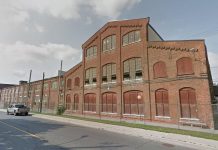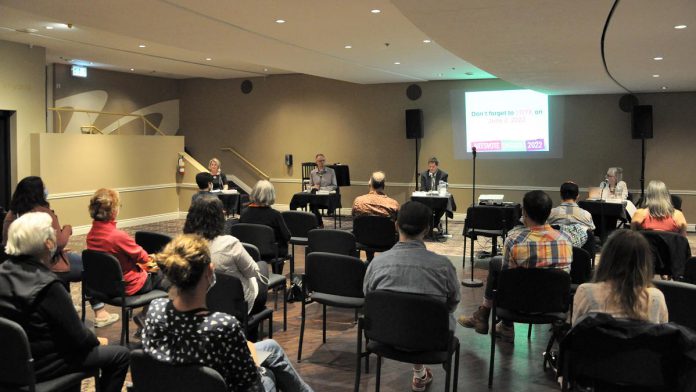
Arts and culture was the topic of the night on Thursday (May 26) at the Nexicom Studio at Showplace Performance Centre, as three Peterborough-Kawartha candidates in the June 2nd provincial election took part in Artsvote Ontario 2022, a debate organized by an “ad hoc coalition” of Peterborough arts groups including the Electric City Culture Council (EC3).
There was one candidate notably absent from the arts debate: Conservative incumbent Dave Smith. The coalition had asked Smith to participate in the arts debate, send a proxy, or submit a video message, but he did not respond to any of these offers.
The three candidates who did attend — Jen Deck (NDP), Greg Dempsey (Liberal), and Robert Gibson (Green Party) — dug into how their respective parties would support the arts and culture industry as well as individual artists.
Following a new format, the discussion focused on four questions developed by coalition members, with all three candidates having submitted written responses to each question in advance.
EC3 executive director Sue Ditta kicked off the night with a passionate defence of arts and culture and its value to Peterborough-Kawartha.
“When we look at what arts organizations invest in the community through their budgets, it’s $10 million,” Ditta said. “We use a multiplier established by Statistics Canada, so it’s about $100 million in spin-off investments.”
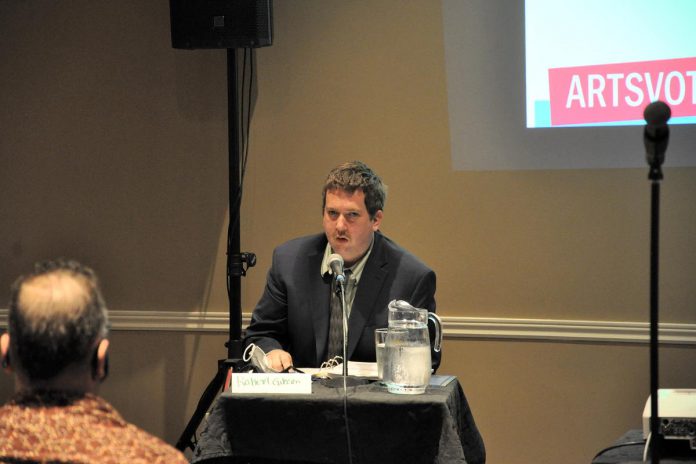
Moderators Nadine Changfoot (Trent University), Steve Guthrie (formerly of CHEX News), Sarah Lewis (Peterborough’s poet laureate), and Ziysah von Bieberstein (poet) each took to the podium to ask one of the questions for the benefit of viewers (along with follow-up questions).
Asked about how a Liberal government would support the ongoing COVID-19 recovery efforts of arts organizations, Greg Dempsey began his first answer by confronting the absence in the room.
“I do want to say that I am disappointed that our MPP (Dave Smith) is not here to talk to us tonight,” Dempsey said. “I have seen reports in the media that his party has deliberately told candidates not to show up to local community debates like this one. This is the job interview, and I think it does a disservice to our democracy to not show up and to tell you about his plans for the arts community in Peterborough-Kawartha.”
With Smith’s absence noted, each candidate ran through his or her platform.
On COVID-19 recovery, Deck said the NDP “will help get artists, performers, and arts and culture workers onto more solid ground, so they can build their best life.”
“We will enact a COVID-19 arts and culture recovery strategy, including operating and marketing stabilization funds, emergency grants, and tax credits to cover PPE and retrofitting costs. We will direct support to artists, live entertainment workers, and cultural workers to keep them afloat.”
Dempsey said the Liberals will “invest $50 million to build, purchase or refurbish performing arts studios, visual arts galleries, and event spaces,” adding the Liberals will ensure “more spaces to feature work from Black, Indigenous, and other artists of colour.”
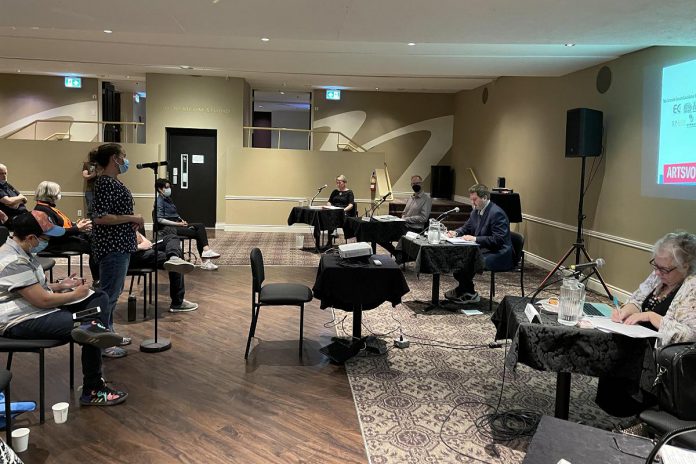
“We will also introduce a living wage, a universal basic income demonstration, and portable benefits that will cover the cost of prescription medicines, mental healthcare, dental care and vision care,” Dempsey added.
The Green Party, according to Gibson, will “develop a program of portable extended health benefits for workers in the gig economy that is tied to the employee even if they were to change employment. As well, the Greens will develop a universal basic income starting with doubling ODSP and Ontario Works.”
As for his party’s commitment to fund artists and arts organizations in Ontario after the cuts of the Conservative government, Dempsey said he is “committed to reversing all of those cuts to all of those organizations.”
“The previous Liberal government spent a considerable amount of time and effort to develop a comprehensive Ontario culture strategy back in 2016,” Dempsey added. “While they made some progress to advance its full implementation, progress stalled over the last four years. A new Ontario Liberal government will ensure that we finish its full implementation.”
Deck said the NDP is committed to stable funding for the arts.
“The NDP will create a provincial arts strategy that centres artists and supports arts, culture, and heritage community-based institutions committed to justice, equity, diversity, and inclusions, and assessing needs through measurable outcomes and we will increase funding to the Ontario Arts Council.”
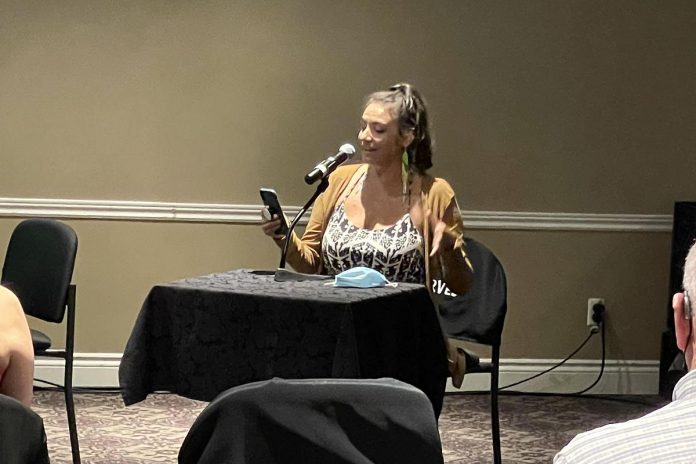
Gibson said, “The Green Party will restore investments in the Ontario Arts Council and the Ontario Trillium Foundation worth $25 million. There is also funding to protect the natural environment that is Indigenous led. The Green party is also committed to all recommendations under the Murdered and Missing Women and Girls Inquiry and other calls to action.”
All three parties agreed to re-establish the Indigenous Culture Fund, cut by the Ford government. The Greens would fund it to $5 million, and the Liberals and NDP would restore its previous $10 million budget.
Asked about advancing diversity, equity, and inclusion for marginalized and racialized artists, including BIPOC — particularly Indigenous artists — and 2SLGBTQ+ artists, each candidate spoke movingly about their commitments.
“I cannot wait to make sure that their voice is my voice,” Dempsey said. “I’ve made my career in social justice and human rights works and we know that arts can be an incredible force for good and acceptance and positivity. We have a plan to set aside $5 million for organizations that represent black voices and $20 million for 2SLGBTQ+ organizations.”
Gibson noted that “this land has been stolen from Indigenous peoples, so it’s important to empower Indigenous-led efforts and to strengthen relationships with Indigenous nations.”
“Representation matters,” Deck said. “To properly address this, we need to start from the ground up. Education is underfunded and school is where children first explore art. They first interact with educators with artistic skills and talents. We know that when we cut education one of the first things that gets cut is arts education.”
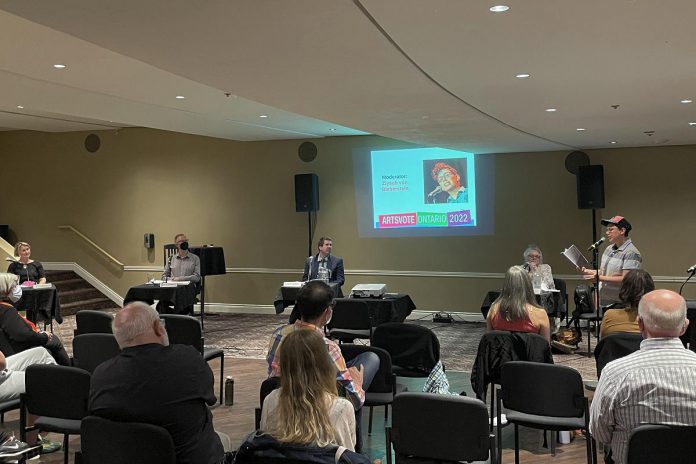
“Putting commitment into arts and culture is of course valid,” Deck added. “It’s a moneymaker. It’s a job generator. It has all of these tangible benefits, but I really truly believe that we will not find our peace until we give children the ability to live and grow in a place that’s safe, and in a place that’s welcoming and affirming. We need to have different lived experiences in our decision-making capacities.”
When asked if they would actively advocate for programs and funding that increase appropriate capital funding and support expansion of digital capacities and other rural specific infrastructure needs, Dempsey reiterated his commitment to being a partner with the Peterborough-Kawartha arts community and Gibson reiterated cost of living mitigation strategies.
Deck spoke specifically about investing in rural infrastructure: transportation, healthcare, and schools.
“We want to double the northern and rural community fund,” she said. “We still have insufficient broadband, so if we want our artists to work in small communities, we need to provide them with stable and reliable broadband. We’ve had 20 years of promises about bringing rural broadband and we still don’t have it. The NDP is very much committed to doing that — that is an equity item and we really discovered that two years ago during the first (pandemic) shutdown.”
The night ended with powerful performances by Peterborough’s first poet laureate Sarah Lewis and poet Ziysah von Bieberstein.
Lewis started by saying, “art saved my life, as a marginalized person, as an Indigenous women, our voices have been silenced historically, and continue to be silenced. When we’re offered a stage, it not only empowers us but it speaks our truth and potentially changes behaviour.”
She then offered a moving rendition of her poem called “More than a Poem,” about the legacy of colonialism and turning the pain of addiction and identity loss into the power of activism, cultural resurrection, and decolonization.
Von Bierberstein followed by first speaking about how “the role of art is to look at things differently, to create the space for transformation.”
They then performed their poem “Stop the Cuts,” that asks us all to dream bigger than simply asking that governments stop cutting services and actually set about the hard, imaginative work of creating the world we want.
“Let’s do better”, they urged. “We will do better.”



